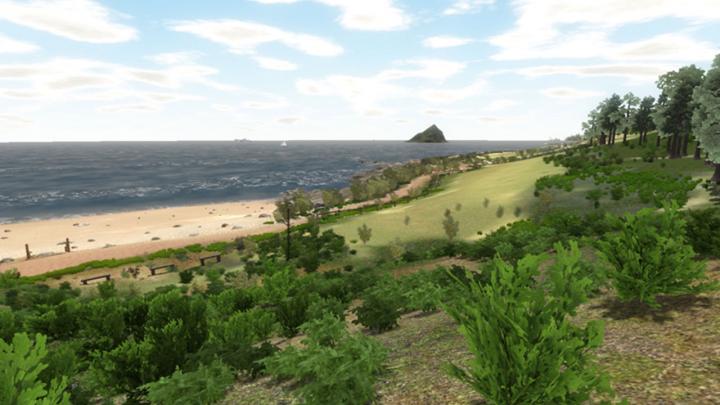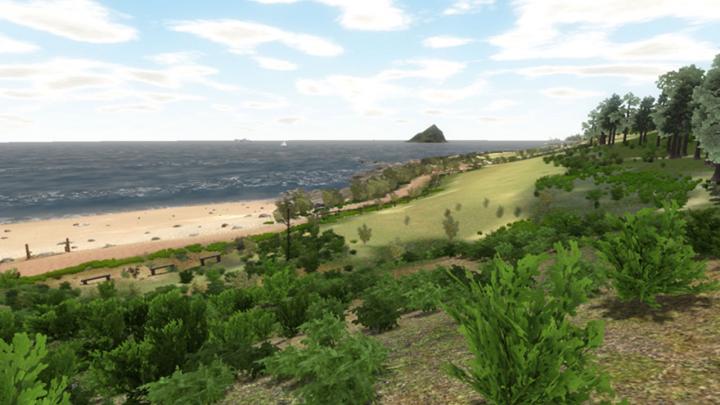
Credit: University of Plymouth
Imagine walking along a South Devon beach on a lovely day. The waves are lapping on the shore, rabbits are scurrying in the undergrowth, and the bells of the local church are mingling with the calls of the seagulls. Then, as you turn to continue along the coast path feeling calm and relaxed you suddenly hear your dentist say "Fine, all done, you can take the headset off now". For patients at one dental practice in Devon, England, such Virtual Reality encounters are resulting in demonstrably better experiences in the dentist's chair.
A link to what the patient sees is here – https://youtu.be/n5kjETt8cZI.
In a study published today (Wednesday 14th June 2017) in the journal Environment & Behaviour, a team of researchers at the Universities of Plymouth, Exeter and Birmingham worked with Torrington Dental Practice in Devon to find out whether experiences like these could improve the patient's experience during routine dental procedures, such as fillings and tooth extractions.
Patients, who had agreed to take part in the study were randomly allocated to one of three conditions: a) standard care (i.e. normal practice), b) a virtual walk around Wembury beach in Devon (using a headset and handheld controller), or c) a walk around an anonymous virtual reality city. Results found that those who 'walked' around Wembury were less anxious, experienced less pain, and had more positive recollections of their treatment a week later, than those in the standard care condition. These benefits were not found for those who walked around the virtual city.
Dr. Karin Tanja-Dijkstra was the lead author of the study. She said: "The use of virtual reality in health care settings is on the rise but we need more rigorous evidence of whether it actually improves patient experiences. Our research demonstrates that under the right conditions, this technology can be used to help both patients and practitioners."
The authors of the research stress that the type of virtual reality environment the patient visits is important. Virtual Wembury was created by Professor Bob Stone and colleagues at the University of Birmingham, and the fact that only patients who visited Wembury, and not the virtual city, had better experiences than standard care is consistent with a growing body of work that shows that natural environments, and marine environments in particular, can help reduce stress and anxiety.
Co-author Dr. Mathew White from the University of Exeter explained: "We have done a lot of work recently which suggests that people are happiest and most relaxed when they are at the seaside. So it seemed only natural to investigate whether we could "bottle" this experience and use it to help people in potentially stressful healthcare contexts."
Dr Sabine Pahl, the project's coordinator at the University of Plymouth, added: "That walking around the virtual city did not improve outcomes shows that merely distracting the patients isn't enough, the environment for a patient's visit needs to be welcoming and relaxing. It would be interesting to apply this approach to other contexts in which people cannot easily access real nature such as the workplace or other healthcare situations."
The Torrington Practice dentist involved in the research, Melissa Auvray, agreed: "The level of positive feedback we got from patients visiting Virtual Wembury was fantastic. Of course, as dentists we do our very best to make the patient feel as comfortable as possible but we are always on the look out for new ways to improve their experiences."
Professor David Moles from the University of Plymouth added "This research is one of a number of initiatives we at Plymouth University Peninsula School of Dentistry have been working on alongside the fabulous team at Torrington Dental Practice and it clearly demonstrates the benefits that can be achieved when academics work in partnership with clinicians in order to address problems that really matter to patients."
The team are hoping to now investigate whether Virtual Wembury can help patients in other medical contexts and whether certain additions to the virtual environment could make the experience even better.
###
Media Contact
Andrew Gould
[email protected]
@PlymUni
http://www.plymouth.ac.uk
############
Story Source: Materials provided by Scienmag




